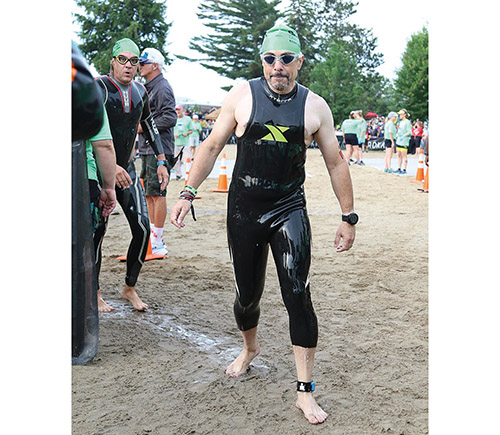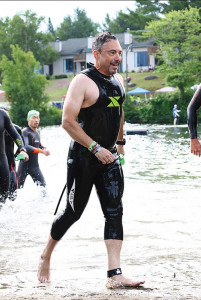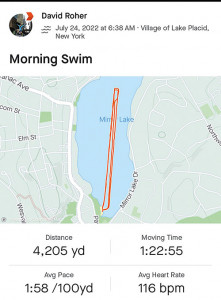
6:43 a.m. Race Start
Together with Shimon, Ruth and I we entered the water together.
It was the only way to be sure who would finish first.

(I don’t understand.)
If we entered one after another, I might finish before Ruth, but she might beat my time.
(Was it really that important?)
Yes. Yes, it was. My job was to motivate and inspire my athletes. What better way than challenging them to beat their coach. It would be the last time I would see either of them for hours.

This was a two-loop lake swim for a total distance of 4,224 yards or 2.4 miles. Every 500 yards I swam triggered a vibration in my watch. For the first 2,000 yards I was averaging a 10 minutes pace. I know because after the first lap I looked at the watch as I ran onto the beach and headed back in for the second loop.
(Why not just have you swim two loops in the lake?)
Because people would cheat and only swim one loop.
(Why is that?)
Kohlberg’s Six Stages of Moral Development says that most people do “the right thing” when faced with punishment for not following “the rules.” Only a select few will do the right thing because it is the right thing to do. That’s why each athlete had a timing chip Velcroed to their ankle.
Now where was I?
(You started your second swim lap at a pace of 10 minutes every 500 yards.)
Right!
The tight pack of swimmers I had encountered on the first loop had thinned out as I continued to focus on the yellow guide cable under the water.
(Yellow guide cable?)
Think yellow cordite explosive wire.
(That’s rather unsettling.)
Actually, it provided me with a level of security I had not experienced at Ironman United Kingdom three weeks prior. Normally, the only way to know if you are swimming in the right direction is to look up every four to eight swim strokes to see if you are headed towards the next yellow marker buoy that floats on the surface of the water. Here at Ironman Lake Placid you also had the yellow guide cable below the water. I checked the watch again at 2,500 yards and at 3,000 yards.
(Didn’t your stopping to look slow you down?)
I held my left hand in front of my face for a split second before submerging my digits beneath the lake water again. I have done this in practice hundreds of times, all for this moment.
At 3,500 the vibration felt late to me.
(How can it have “felt” late?)
Fatigue was setting in. There was a burning in my triceps and shoulders that was building with each rotation of my arms. I was forcing myself to literally “dig” with my hands as I inserted my fingers into the lake to propel myself forward. My watch buzzed again as I made the final turn and headed towards the beach. I looked; 11+ minutes. I had done the math before the race. To break my previous Ironman finish time of 15 hours, 23 minutes, I needed a swim time of one hour and 25 minutes. Ignoring the ever-increasing pain, I just kept putting one hand in front of the other and focused on my breathing. As the beach came into eyesight my watch buzzed for the final time. I was now at 4,000 yards and I was pacing at 13 minutes per 500 yards.
Note to self, more long swims in 2023.
As soon as my hand touched the sandy bottom of the lake it was time to stand up and walk out.
(Where was Shimon and Ruth?)
I suspected that they were behind me.
(You didn’t wait for them?)
Nope, this was a race, not a Sunday afternoon stroll. I would have yelled at them to “move your tuchus” had I seen them waiting for me.
I walked over the timing mat and paused my watch: one hour, 22 minutes and 55 seconds.
(So, you made your first benchmark?)
It was within two minutes of my record for this swim distance, so all those early morning swims had paid off. Between the swim exit and the path out of the beach were a gaggle of volunteers.
(They were geese?)
You know what I meant. I plopped down on my butt in front of the volunteers and they peeled that wetsuit off me like it was a banana peel and I was the banana.
I stood up, grabbed my waterlogged suit, thanked the volunteers and walked quickly.
(You didn’t run to your bike?)
The carpeted path from the beach to the street was waterlogged. I had no intentions of slipping and getting hurt.
I trotted down the block with my wetsuit flung over my shoulder again and my feet went “swish” with every step. The path between the swim and the bike is akin to a fashion show catwalk. Triathletes, most of whom were only wearing skin-tight swim shorts, moved quickly past screaming crowds. Once across the street, I was on the cool grass of the Olympic oval. I grabbed my transition bag of bike gear and I headed into the changing tent.
Once inside I sat down and opened the bag … and realized that the one thing I had to have for the bike ride was not there…
David Roher is a USAT certified triathlon and marathon coach. He is a multi-Ironman finisher and veteran special education teacher. He is on Instagram @David Roher140.6.
He can be reached at [email protected].










